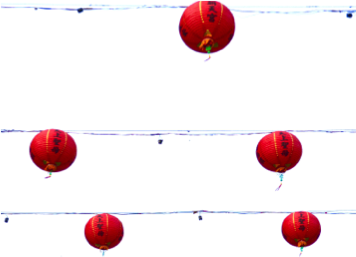6 Simple Ways Anyone Can Celebrate Chinese New Year
Chinese New Year is widely considered to be the most important holiday in China. Known in Mandarin as Chūnjié|春节 or Guònián|过年, it is a period symbolized by family reunion (tuánjù|团聚), and represented by various customs that Chinese people across the world take part in over a span of several weeks leading up to and following the start of the new year. This month, as we get ready to say goodbye to the Monkey and welcome in the Fire Rooster, remember, just as so many people around the world celebrate Christmas regardless of culture and ethnicity, you don’t have to be Chinese or living in China to celebrate Chinese New Year. This special holiday is really about family, a fresh start, and good wishes for you and your loved ones. True to the essence of Chinese New Year, here are 6 simple things you can do this year to join in on the festivities and bring happiness to those around you, wherever you may be in the world.
-
Gather your family or close friends together for a big meal
The most important activity of Chinese New Year is niányèfàn | 年夜饭 – New Year’s Eve dinner, when all family members get together for a big feast. Traditionally, during this time, foods symbolizing happiness, wealth, and good fortune are prepared, often represented by their shape or the sound of the word in Mandarin. In the old days, such foods were considered delicacies, eaten only on special occasions, as they were typically too expensive for the average citizen to eat on a daily basis. This year, take the opportunity to gather those you love together for a meal and choose foods that symbolize your well wishes for them. Common dishes found in a traditional New Year’s feast may include:
-

Photo: Wikimedia Commons
Dumplings jiǎozi|饺子, known for their round shape symbolizing wealth (which look like silver ingots from the old days), mainly eaten in Northern China during Chinese New Year.
- Fish Yú|鱼, representing prosperity. It is a play on words (referred to as xiéyīn|谐音) as the pronunciation of鱼 is the same as 余, symbolizing surplus of money and a wish for more than we need in the coming year. During this time, people will say “nián nián yǒu yú|年年有余” meaning “may you have surplus every year”.
- Chicken jī|鸡, may appear as part of the feast, to symbolize yet another play on words as 鸡and 吉sound similar. You can say jíxiáng rúyì|吉祥如意 wishing people good fortune and good luck according one wishes.

Photo: Wikimedia Commons
- Glutinous Rice Cakes niángāo|年糕, refers to wishes to continue to gain a higher income or position in the new year (you can say “Nián nián gāo|年年高”)
- Sweet Rice Balls in Soup (tāngyuán|汤圆 or yuánxiāo|元宵), eaten on the 15th and final day of the Chinese New Year festivities, known as the Lantern Festival or Yuánxiāojié|元宵节. Their round shape symbolizes reunion and family. You can say “Tuántuán yuán yuán|团团圆圆”, meaning desire for a happy family reunion.
Keep in mind that you don’t have to be a master chef to organize niányèfàn | 年夜饭. Your local Asian grocery store or a nearby Chinese restaurant will likely have most of these dishes. Alternatively, a potluck is always a fun way to gather people together for a big meal.
-
Take a moment to appreciate your loved ones
In Mainland China, Chinese New Year inspires the largest annual human migration in the world, known as chūnyùn|春运,with millions of people travelling long distances to return home (fǎn xiāng guònián|返乡过年), bearing gifts for their loved ones, and crowding on trains, buses, and highways, as depicted in the video shown here.
https://www.youtube.com/watch?v=8VJ_c4WvDJg
For many less fortunate, this is the only chance in the entire year they may have to see their loved ones, as many were forced by their economic situation to move far away from their rural hometowns to earn money in prosperous cities such as Shanghai, Beijing, and Guangzhou. Furthermore, thousands of students studying in provinces far from their hometowns also make the journey home during this time to be reunited with their families and celebrate with their elders (zhǎngbèi|长辈). However, there are also a great many other people unable to celebrate with their families because they either cannot afford to go home for the holidays or they are living abroad. Even if your family doesn’t celebrate Chinese New Year, with modern technology, it’s easy to use this as a time to appreciate your loved ones, and send your wishes to those friends and family afar. And perhaps, take a moment to be grateful you do not need to make that aching day-long or even, multiple-day, journey to see your loved ones like millions across China do each year.
-
Pull an All-nighter on New Year’s Eve (Chúxì shǒusuì|除夕守岁)
See the old year out and welcome in the new! While some people aim to only stay up until midnight, it’s also common to try to stay up all night. Traditionally believed to ward off bad spirits and beasts, after the New Year’s Eve dinner (niányèfàn | 年夜饭), people will stay up chatting and playing games together. It is believed the louder you are, the more easily scared off the spirits will be. Take advantage of this opportunity to spend quality time with your family or friends, and see how late you can stay up. Watch this short cartoon showing one Grandfather’s explanation of the traditional story behind chúxì shǒusuì|除夕守岁, as well as an introduction of the main dishes for their New Year’s Eve feast.
-
Give little red pockets of fortune

Photo: Wikimedia Commons
Consider giving your family, friends and colleagues little red pockets called hóngbāo|红包. Traditionally given to those younger than you (called yāsuìqián|压岁钱 during Chinese New Year), they are also given by adult children to parents and grandparents to show filial respect to elders (known as xiàojìng|孝敬). For fun, you can give red pockets to friends and family; instead of stuffing them with money, perhaps add in thoughtful note, a chocolate, or something else creative.
-
Clean up your house and clean up yourself before the start of the New Year.
Get rid of the old and welcome the new! Traditionally before the start of the Chinese New Year, a thorough cleaning of the entire house (sǎo chén|扫尘) will be done. Furthermore, what better time to freshen up your look than the new year with a haircut and some new clothes? However, be sure to do these activities several days before the start of the new year – the last thing you want to do is sweep away any good luck the new year brings in!
-
Wear Red
Traditionally Chinese New Year inspires people to wear red, symbolizing joy (xǐqìyángyáng|喜气洋洋) and a prosperous life (hónghóng huohuǒ | 红红火火). You can show your appreciation for this holiday by wearing red during and after the New Year festivities. This is especially important if this is your zodiac year (běnmìngnián本命年), which is believed to signify a challenging year ahead. Wearing red is thought to bring good luck and good fortune.
Celebrating Chinese New Year doesn’t have to be complicated, nor do you need to be living in China to take part in the festivities. To further illustrate that anyone can celebrate Chinese New Year anywhere, refer to the hit American sitcom Fresh off the Boat for a hilarious depiction of how you can celebrate Chinese new year despite the most difficult circumstances. In the entertaining video clip below, they try to explain to their American friends the traditions of Chinese New Year.
By doing any of the above 6 activities this year, you can use this as an opportunity to show your loved ones how much you care about them. After all, that’s really the true essence of this important holiday. At the same time, your Chinese friends and colleagues will appreciate your effort in showing respect and understanding towards their most culturally significant celebration of the year.
Wishing everyone 祝大家:
A happy new year 新年快乐!
Good Health 身体健康!
And all things as you wish 万事如意!

Photo: Enging Chan
Big crowds and celebrations not your thing? Stay home and study.
Why not work through our Chinese New Year playlist containing informative and interesting lessons? Subscribe today to get access! ChinesePod is offering a one month premium subscription for just $0.99! Check it out at http://bit.ly/2t2E7VL
Eng Chan
Latest posts by Eng Chan (see all)
- International Women’s Day doesn’t need these two words - March 7, 2019
- Chinese New Year Red Envelopes: How to Give and Receive “hóngbāo” Like a Local - February 9, 2019
- 6 Simple Ways Anyone Can Celebrate Chinese New Year - February 7, 2019



